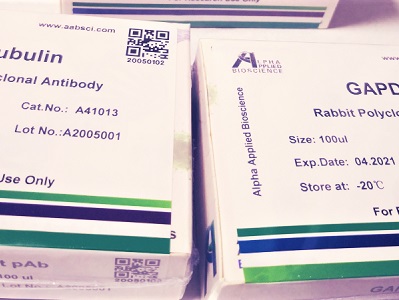

KCNQ1 rabbit pAb
Cat :A16653
-
Source
Rabbit
-
Applications
WB,ELISA
-
Reactivity
Human
-
Dilution
WB 1:500-2000 ELISA 1:5000-20000
-
Storage
-20°C/1 year
-
Specificity
KCNQ1 Polyclonal Antibody detects endogenous levels of protein.
-
Source/Purification
The antibody was affinity-purified from rabbit antiserum by affinity-chromatography using epitope-specific immunogen.
-
Immunogen
Synthesized peptide derived from human protein . at AA range: 350-430
-
Uniprot No
P51787
-
Form
Liquid in PBS containing 50% glycerol, and 0.02% sodium azide.
-
Clonality
Polyclonal
-
Isotype
IgG
-
Background
potassium voltage-gated channel subfamily Q member 1(KCNQ1) Homo sapiens This gene encodes a voltage-gated potassium channel required for repolarization phase of the cardiac action potential. This protein can form heteromultimers with two other potassium channel proteins, KCNE1 and KCNE3. Mutations in this gene are associated with hereditary long QT syndrome 1 (also known as Romano-Ward syndrome), Jervell and Lange-Nielsen syndrome, and familial atrial fibrillation. This gene exhibits tissue-specific imprinting, with preferential expression from the maternal allele in some tissues, and biallelic expression in others. This gene is located in a region of chromosome 11 amongst other imprinted genes that are associated with Beckwith-Wiedemann syndrome (BWS), and itself has been shown to be disrupted by chromosomal rearrangements in patients with BWS. Alternatively spliced transcript variants have been found for this gene. [provided by RefSeq,
-
Other
KCNQ1 KCNA8 KCNA9 KVLQT1, Potassium voltage-gated channel subfamily KQT member 1 (IKs producing slow voltage-gated potassium channel subunit alpha KvLQT1) (KQT-like 1) (Voltage-gated potassium channel subunit Kv7.1)
-
Concentration
1 mg/ml
| Product | Reactivity | Applications | Conjugation | Catalog | Images |
|---|
-
 400-836-3211
400-836-3211
-
 support@aabsci.com
support@aabsci.com
-
β-actin rabbit pAb ...... >
-
β-actin rabbit pAb(A284) ...... >
-
Plant-actin rabbit pAb ...... >
-
β-tubulin mouse mAb(M7) ...... >
-
GAPDH mouse mAb(2B8) ...... >
-
GAPDH mouse mAb(PT0325) ...... >
-
Histone H3 rabbit pAb ...... >
-
Histone H3 rabbit pAb ...... >
-
COX IV mouse mAb(6C8) ...... >
-
GFP-Tag mouse mAb(1G6) ...... >
-
HA-Tag mouse mAb(1B10) ...... >
-
mCherry-Tag mouse mAb(6B3) ...... >










 400-836-3211
400-836-3211
